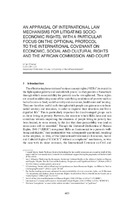An appraisal of international law mechanisms for litigating socio-economic rights, with a particular focus on the optional protocol to the international covenant on economic, social and cultural rights and the African Commission and Court
Abstract
Litigation of socio-economic rights at international level is a viable option where access to justice at the national level is unattainable. International law mechanisms for litigating these rights are therefore useful for marginalised groups and people living in poverty. This is also based on the important role of these mechanisms in ensuring that States meet the obligations they have committed to in human rights treaties, and provide effective remedies in cases of violations. This article assesses, taking into consideration some broad principles, the international law mechanisms for litigating socio-economic rights at the UN and African regional levels, particularly the Optional Protocol to the International Covenant on Economic, Social and Cultural Rights ("OP-ICESCR") and the African Court on Human and Peoples' Rights and the African Commission on Human and Peoples' Rights complaints mechanisms. The article illustrates that while these mechanisms have the potential to advance the rights of the poor and marginalised, and in some case have been successful in doing so, they are not without drawbacks that impact on their effectiveness.

